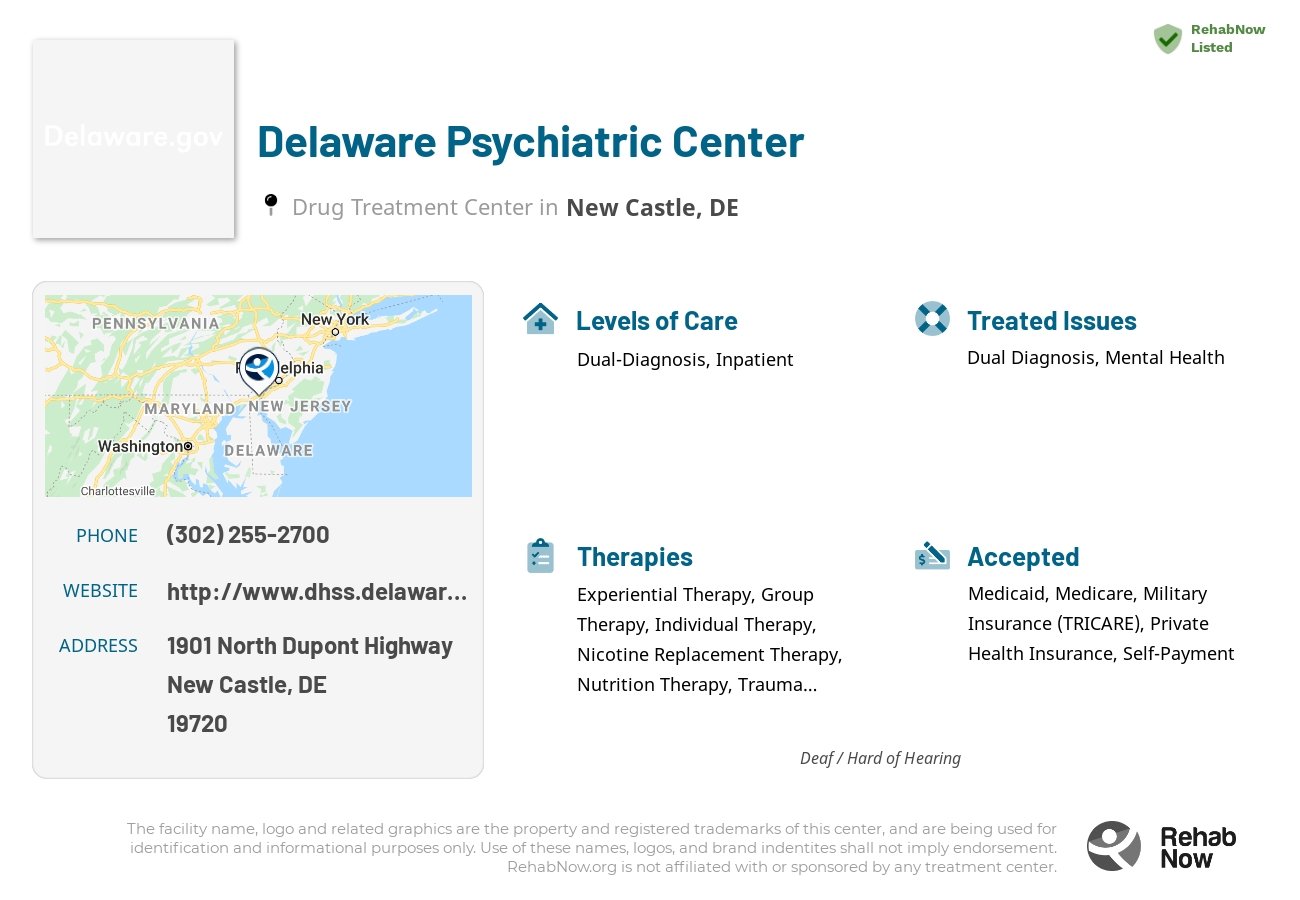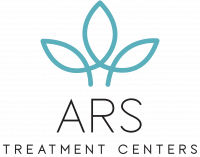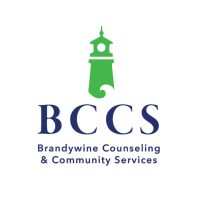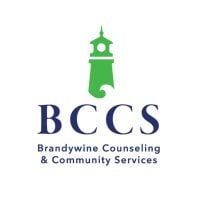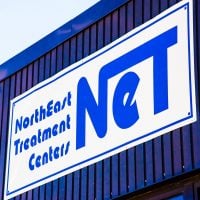Delaware Psychiatric Center
Drug Rehab Center in New Castle, Delaware
Delaware Psychiatric Center provides inpatient and partial hospitalization mental health and addiction treatments with specialized treatment plans and a multidisciplinary treatment team, offering a variety of services such as individual and group therapy, medication management, and family counseling to support long-term recovery.
About This Delaware Facility
Delaware Psychiatric Center in New Castle, Delaware, is an inpatient and partial hospitalization facility that provides comprehensive mental health and addiction treatments to individuals experiencing mental health and addiction issues. It offers specialized treatment plans tailored to meet the needs of each individual and facilitate their recovery. The multidisciplinary treatment team at Delaware Psychiatric Center includes psychiatrists, psychologists, counselors, nurses, and therapists experienced in treating addiction and mental health disorders.
Delaware Psychiatric Center provides a variety of services to treat addiction and substance abuse, such as individual and group therapy, interventions, and 12-step programming. Clients are also provided with medication management and withdrawal management services to address the physical aspects of addiction while emphasizing the therapeutic process. Resources such as life skills training, trauma-informed practices, and family counseling are also available to support clients' long-term recovery and provide them with the tools they need to succeed.
Delaware Psychiatric Center is accredited by The Joint Commission, a national organization that monitors healthcare practices and provides certifications for providers. Furthermore, it is licensed by the Delaware State Department of Mental Health and Substance Abuse Services and is recognized by the National Institute on Drug Abuse for its commitment to providing quality addiction treatment services. Delaware Psychiatric Center is also affiliated with the American Society of Addiction Medicine and the Better Business Bureau.
Genders
Ages
Modality
Additional
Conditions and Issues Treated
Dual Diagnosis refers to someone who is both dealing with addiction and another mental health issue.
There are different kinds of Dual Diagnosis: A person who simultaneously experiences both a mental illness and an addiction disorder. Or, a person who experiences one or more coexisting (simultaneous) mental health conditions in addition to a primary substance use disorder.
Some conditions that commonly co-occur with addiction include:
- Personality Disorders (Borderline, Narcissistic)
- Mood Disorders (Bipolar Disorder, Depression, Anxiety Disorder)
- PTSD (Post Traumatic Stress Disorder), OCD (Obsessive Compulsive Disorder), ADHD (Attention Deficit Hyperactivity Disorder)
- Schizophrenia, Psychosis, Hallucinations, Delusions
Levels of Care Offered at Delaware Psychiatric Center
This center offers a variety of custom treatment tailored to individual recovery. Currently available are Dual-Diagnosis, Inpatient, with additional therapies available as listed below.
Individuals who are suffering from severe addiction or have a high risk for dangerous health concerns are often recommended to receive inpatient treatment.
Choosing to enter an inpatient treatment program is beneficial for people who are suffering from severe addiction, or who have a high risk for dangerous health concerns.
Inpatient treatment is beneficial for:
- People who have a history of severe withdrawal.
- People who have attempted to overcome addiction on their own without success.
- People who have a history of relapse, or have recently relapsed.
- People at risk for drug overdose or withdrawal-related complications.
- People with medical conditions that are worsened by drug or alcohol use.
Therapies & Programs
Therapy sessions focused on the individual addict can provide much-needed guidance as they work toward overcoming their addiction. These types of sessions typically involve guidance from a therapist, who will help addicts identify and process their feelings and cravings.
During these sessions, addicts may develop plans for coping with the triggers that typically lead to relapse and learn how to avoid those triggers during their recovery process.
Different types of addiction treatment services are available. Within this article, group therapy is of interest due to its high success rate compared to individual therapy. Group therapy settings are beneficial because they allow recovering addicts to build a strong support network.
Benefits of group therapy are:
- Reduces feelings of isolation
- Immediate access to social support in the form of fellow addicts in recovery
- Lowers risk of relapse
- Increases rate of sobriety
- Builds coping skills that can be applied to everyday life
Trauma Therapy is a form of therapy that involves working with a patient to help them process and understand the past trauma(s) in their life. The idea behind it is that while some people can experience traumatic events and not have lasting psychiatric symptoms, many others will. In these cases, memories of the event get hidden from consciousness but continue to influence how the person processes and copes with things in their life. They may avoid situations that resemble what happened or become suddenly angry or irritated to a situation that reminds them of a past event.
With the help of a therapist, people can go back over memories and experiences. This helps them understand why they are having problems coping with certain situations and how they can change how they think and react to things. This therapy is typically done using techniques such as visualization, discussion, and writing down thoughts and feelings.
Trauma therapists will work with clients to help them understand their past and present relationships. Many times, patients may believe that something is inherently wrong with them or that they are unworthy of love. A therapist aims to correct these negative feelings and behaviors by helping the person realize that their actions do not reflect who they truly are.
One of the main goals of trauma therapy is to help clients express their emotions and talk about what they are feeling. This benefits both to increase awareness of how certain events have impacted them in the past and enables patients to realize that they can make changes in their lives.
Cognitive Behavioral Therapy (CBT) is used by drug treatment centers to help addicts comprehend the causes of their substance abuse and the consequences that follow. Through CBT, clients learn to recognize and avoid high-risk situations and cope with challenging situations when they arise.
CBT treatment often includes a combination of individual therapy, group therapy, lectures, and other activities. The treatment’s goal is to help addicts gain self-control and maintain abstinence from drugs and alcohol over the long term so that an addict can get sober and lead a more productive life.
CBT is particularly effective in helping people overcome their drug problems, especially people whose drug abuse is motivated by self-defeating beliefs and emotions.
Good nutrition can be difficult for people recovering from addiction because they may not feel like eating while they are experiencing the physical and emotional side effects of detoxing.
Nutrition therapy can help addicts in the following ways:
- Helps individuals to understand which foods promote good health and support recovery that will assist them during detox
- Provides guidance and education in New Castle, Delaware about how to maintain a nutritious diet so they can stay healthy during recovery
- Improves their overall health and well-being, which can reduce the severity of substance withdrawal symptoms.
Nicotine replacement therapies are effective because they provide you with the nicotine you are addicted to without inhaling carcinogens from cigarettes. Some types of NRT include nicotine gum, nicotine patches (transdermal systems), nasal spray, and lozenges. The benefits of using NRT can include reducing the risk of heart disease and cancer.
Patient Experience
Experiential Therapy at Delaware Psychiatric Center
Experiential therapy is a form of psychotherapy where patients are asked to engage in activities such as role-play, poetry writing, music composition, exercising, or journaling to help process intense feelings. The aim of the therapy is to help patients access deeper, often hidden emotions by helping them explore their own body and mind.
Payment Options Accepted
For specific insurance or payment methods please contact us.
Is your insurance accepted?
Ask an expert, call (888) 674-0062
Additional Details
Specifics, location, and helpful extra information.
New Castle, Delaware 19720 Phone Number(302) 255-2700 Meta DetailsUpdated November 25, 2023
Staff Verified
Patient Reviews
There are no reviews yet. Be the first one to write one.
New Castle, Delaware Addiction Information
The Delaware substance abuse statistics show that the number of deaths due to drug injury is higher than the national average. Over 16% of all deaths in the state between 2008 and 2017 were caused by drugs and alcohol. The state has been rolling out more services to address addiction in an effort to get help to those who need it.
The drug addiction situation in New Castle, Delaware, is quite serious. According to recent statistics, there were over 1,000 hospitalizations due to drug overdoses in the city in 2016. There were over 9,000 arrests related to drug crimes that year. There are various approaches to treatment, such as 12-step programs and holistic treatments. It is important to find the right program for each individual, as not every approach will work for everyone.
Treatment in Nearby Cities
- Milford, DE (55.0 mi.)
- Rehoboth Beach, DE (72.8 mi.)
- Laurel, DE (79.1 mi.)
- Millsboro, DE (78.2 mi.)
- Smyrna, DE (27.7 mi.)
Centers near Delaware Psychiatric Center
The facility name, logo and brand are the property and registered trademarks of Delaware Psychiatric Center, and are being used for identification and informational purposes only. Use of these names, logos and brands shall not imply endorsement. RehabNow.org is not affiliated with or sponsored by Delaware Psychiatric Center.


